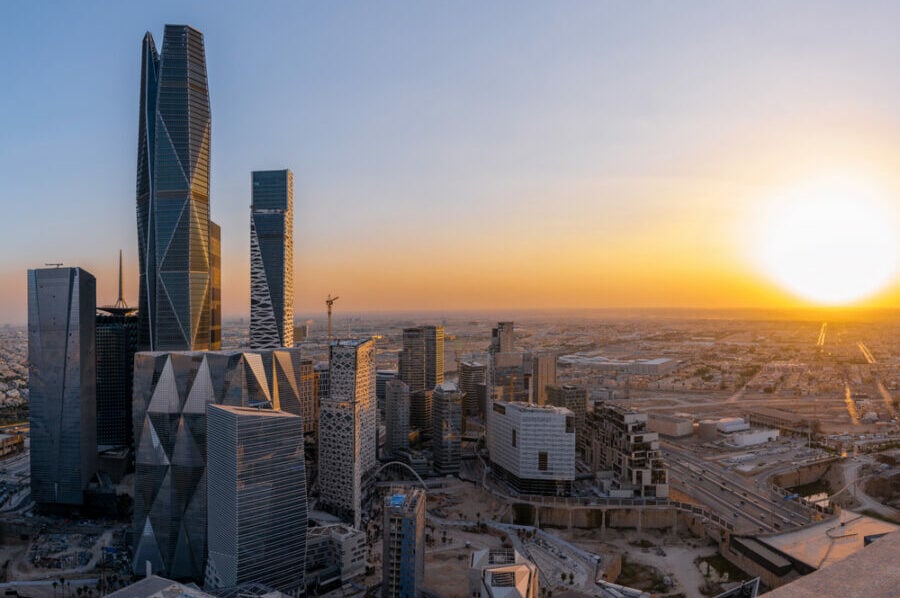Macroeconomic factors may impact project development in the wider MENA region in 2023. But the Gulf region is unlikely to face a cash crunch anytime soon, according to Jesús Sancho, Middle East managing director at ACCIONA.
The Spanish construction company’s regional projects portfolio includes the Buraydah-2 wastewater treatment plant in Saudi Arabia and Dubai Metro Route 2020 and Expo 2020 Sustainability Pavilion in the UAE, among others.
Macroeconomic impact
Rising interest rates, inflation, and building material prices will all influence MENA projects’ markets in 2023.
Sancho tells Economy Middle East rising interest and inflation could decrease public borrowing and spending, culminating in a slowing of government construction investments.

“However, in most GCC countries, the economy continues to grow and employment levels remain strong, which shall support demand for the construction sector.
“UAE, Qatar and especially Saudi Arabia are experimenting significant growth in the construction market fueled by high public spending underpinned by the current oil prices.”
READ MORE: Progress likely on PPPs in the GCC this year
International conflict may affect the availability of finance in the Middle East, but this is “not envisioned at the moment”.
Sancho adds: “We do not foresee a shortage of liquidity for construction projects in the GCC.
“Oil price ranges in 2023 are predicted to remain north of $70. This should help GCC economies maintain growth while keeping commitments and targets to achieve higher levels of sustainable growth.
“GCC governments have implemented solid PPP laws. These legal, social, and financial frameworks will help attract even more foreign investment from 2023 onwards.”
ACCIONA solutions
Reducing waste, raising supply chain efficiency, and negotiating supplier prices have been ways for ACCIONA to cut costs in response to external market fluctuations.
“Additional measures include re-evaluating project budgets, adjusting accounts for rising costs, and negotiating price escalation formulas. The latter is to allow more realistic pricing for projects,” Sancho explains.
“We’re also exploring alternative solutions – more cost-effective materials or finding new suppliers – to reduce costs and maintain competitiveness.”
Yet another macroeconomic trend to which construction contractors must respond is environmental, social, and governance (ESG) requirements.
ESG and tech in MENA construction
Sancho says ESG awareness and implementation have been growing in recent years, driven by increased demand from customers, investors, and stakeholders. But “there may still be some resistance or challenges in fully integrating ESG considerations into business practices and decision-making processes”.
He adds: “Understanding and embracing ESG principles varies among developers, contractors, and suppliers in the regional engineering market.
“Some companies may have a strong understanding and commitment to ESG principles, while others may have limited knowledge or prioritization of these issues.”
Government authorities and entities are starting to recognize why ESG principles are essential for long-term success. But Sancho agrees that ESG implementation is still in its early stages in the MENA construction sector and there is room for improvement.
Lack of standardization, limited data and reporting, and insufficient investments are among the roadblocks to wider ESG adoption in the MENA engineering sector.
“Despite these challenges, many regional construction companies are taking steps to integrate ESG considerations into their operations and decision-making processes.”
READ MORE: How technology can support construction ESG compliance
Technology can play a major role in helping to drive ESG compliance in the MENA construction sector. Building information modeling (BIM), drones, and virtual/augmented reality platforms are finding more takers regionally.
Greater tech adoption is likely as Middle East project developers seek improved efficiency and reduced costs, Sancho says.
“The implementation of the digital twin tools, providing real-time construction project data, is becoming more common. It is also allowing for better monitoring and control. Smart cities and building technologies are also gaining traction in the region. This is with the aim of reducing energy consumption and improving sustainability.”
Urbanization roadmap
Urbanization will be an important trend to watch in the coming years. Oil price fluctuations or an economic slowdown may impact investment in urbanization projects.
“The Middle East region is also facing challenges with a growing young population, which may put pressure on the real estate market and push demand for new residential projects,” Sancho says.

“Water scarcity is a significant issue in many regional countries. This may pose challenges for urbanization projects that require large amounts of water to serve an ever-growing population.
“Rapid urbanization can result in environmental degradation. There may be opposition from local communities and environmental groups to new projects that are seen as a threat to the environment.
“Cultural and traditional attitudes towards development too may lead to resistance from some local communities to new urbanization projects.”
The road ahead
Higher pre-2014 oil prices impacted project financing but recent diversification efforts may cushion the potential blow of future petrodollar declines.
“These diversification efforts have helped to mitigate the impact of fluctuating oil prices on the financing of projects in the region,” Sancho says.
“However, oil prices still play a role in regional project financing. This is especially true where the oil sector is a dominant economic contributor. The extent to which oil prices affect future regional project financing will depend on the progress and success of each country’s diversification efforts.”
READ MORE: New Murabba could play a pivotal role in Riyadh Expo 2030 bid
Neighboring markets hoping to emulate diversification successes must turn to Dubai. Sancho says the city has been “excellent” in developing innovative infrastructure and transportation systems and diversified industries like tourism, renewable energy, and smart cities.
“Qatar is also developing a strong energy sector and is investing in education and healthcare. The country is enjoying strong diplomatic and economic relations with other countries as well,” he continues.
“It is admirable how Saudi Arabia is diversifying away from oil, promoting entrepreneurship and small businesses, and investing in innovation. It is doing all this while totally transforming the landscape of the country through its gigaprojects and other initiatives.”








